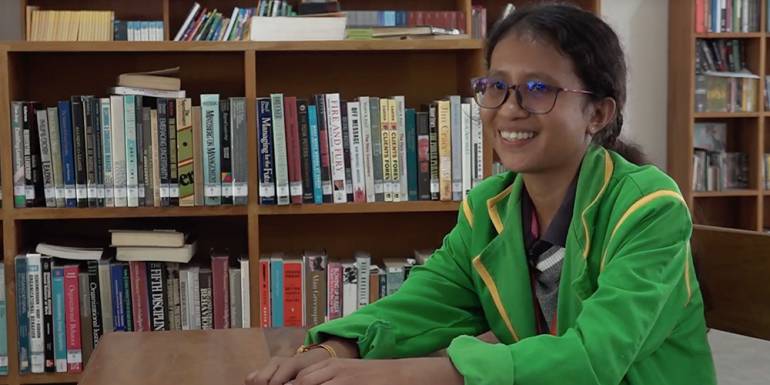Young Timorese teachers hope to bring about change in society

Jesuina, a 21-year-old scholarship student at the Jesuit-run Instituto de So João de Brito (ISJB) in Timor-Leste, says she hopes to become a good and effective teacher who can change her country.
With quality education, the country and people can create better opportunities for each other, she adds.
Echoing the words of Nelson Mandela, the national hero of South Africa and a Nobel laureate, Jesuina believes education is the most potent weapon to transform society.
After she graduates from teacher's training, she hopes to work in a rural area and empower marginalized communities who need education most for their well-being and progress.
Like Jesuina, there are 460 students at ISJB, built in 2018, next to the secondary school Colégio de Santo Inácio de Loiola (CSIL), which Jesuits also manage.
The Jesuit-run teacher training institute in Dili, the capital of East Timor, aims to promote quality learning for aspiring teachers.
The institute is committed to creating the next generation of Timorese teachers, who will shape the country's future through progress, prosperity, and empowerment.
ISJB is regarded as a top institution for training teachers because it produces ethical, highly competent, and knowledgeable professionals who can lead in education, particularly where it is most needed.
Jesuina, majoring in English and teaching English at ISJB, believes that the global language may provide opportunities and development for Timor-Leste's future generations.
She receives a subsidy for her education and has been a member of the alumni program since she graduated from CSIL.
This has had a transformative effect on her and her family because she can now relieve her mother of some of the financial responsibility for the family's upbringing since Jesuina's father died a few years ago.
"With the alumni allowance, I can take care of my basic needs, buy books, and support my mother and siblings if they ever need anything," she said. "I occasionally use it for my siblings' education, clothing, and food. We help one another."
Young Timorese, like Jesuina, represents transformation and hope in their native country.
The students participate in periodic community service and decide to help those in need in their areas because of their development in the Jesuit culture at ISJB to be "men and women for others."

Father Joaquim Sarmento, leader of the Society of Jesus community in Timor-Leste, says the nation needs new generations of well-qualified educators with solid moral foundations as ethical leaders and educators.
He adds that future teachers need intelligence and passion to serve the country through quality teaching.
According to him, people log in to have better work, a healthier life, access to knowledge, and a reasonable level of living with quality education in both rural and urban locations.
To hone and improve young people's abilities, the Timor-Leste government sent instructors who worked in public schools to the Jesuits' teacher training institute.
Timor-Leste gained independence in 2002 after two phases of colonialism—first from Portugal and later from Indonesia.
Due to hostilities related to independence, East Timor came dangerously close to being destroyed and lost its talented people in every sector, including education.
Rebuilding all sectors' infrastructure is crucial for true independence, but more importantly, it is essential to train experts and professionals who can ensure society's autonomy and the state's sovereignty. Education is vital in this scenario.
Teacher preparation is one strategy the East Timor-Leste government has looked at to improve the country's educational system.
The government has recently invested in crucial facets of the education sector, including renovating educational facilities, enhancing the educational system, and training future teachers.
Timor-Leste is one of the least developed countries in the world and a young democracy.
According to a recent United Nations Development Program (UNDP) assessment, Timor-Leste has made advancements in human development this century. Still, the rewards of that growth have not been distributed fairly, especially to people who live in rural areas or marginalized communities that lack many human resources and competencies.
Timor-Leste is ranked 131 out of 189 countries in the UNDP's most recent Human Development Report (HDR) 2019, placing it in the nations with medium human development category.
Timorese, who reside in rural areas and make up more than 60% of the population, suffer significant dangers from climate change.
The UN Human Development Report 2019 says the country needs to invest more resources in young children's learning, health, nutrition, and economic empowerment, says UNDP's Senior Policy Advisor and Development Economist, Fausto [Nino] Belo Ximenes.
Furthermore, Tuya Altangerel, the UNDP Resident Representative, says the significance of youth in Timor-Leste is that it has a youth bulge.
In contrast, other countries in the region, like Japan, have an aging population. She adds that this may be turned into a 'youth dividend,' which would make East Timor's labor force more competitive with the correct investments in health and education.
Regarding religious data, the Protestants and Muslims, who make up 2% of the population, and the other two recognized religions in East Timor, live side by side with the 98% of practicing Catholics in the country in peace and cooperation.
Radio Veritas Asia (RVA), a media platform of the Catholic Church, aims to share Christ. RVA started in 1969 as a continental Catholic radio station to serve Asian countries in their respective local language, thus earning the tag “the Voice of Asian Christianity.” Responding to the emerging context, RVA embraced media platforms to connect with the global Asian audience via its 21 language websites and various social media platforms.














